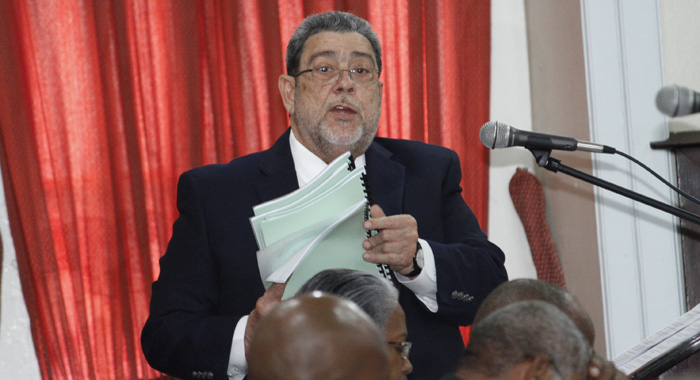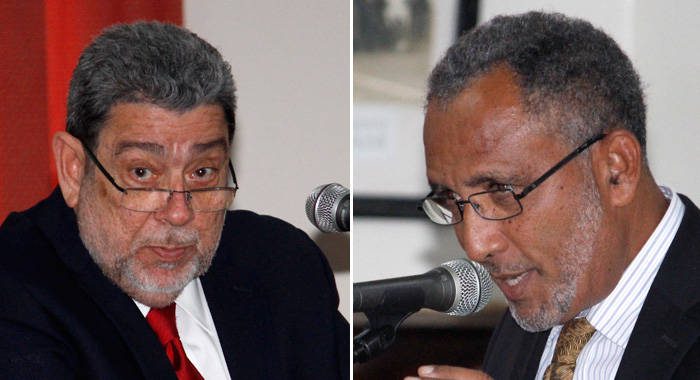The debate over accountability for monies spent to construct the EC$700 million Argyle International Airport degenerated into name calling in Parliament on Tuesday.
Leader of the Opposition, Godwin Friday, who intensified the discussion since an April 19 press conference, brought the question to Parliament.
He asked Prime Minister Ralph Gonsalves to tell lawmakers how up to date the International Airport Development Company is in filing financial statements at the Commercial and Intellectual Property Office (CIPO).
Friday also wanted to know when the IADC, a state-owned company, will be up to date in the filing of financial statements and when the when the account or manner in which the money spent by the IADC will be reported to Parliament.
In his response, Gonsalves, who is also Minister of Finance, said that the question was part and parcel of parliamentary accountability.
He reiterated his government’s position that the IADC’s accounts do not have to be brought to parliament, but must be lodged at CIPO, in keeping with the Companies Act.
He told Parliament that the outstanding accounts should be completed by July 2017.
Gonsalves said that when monies — say a loan from the ALBA bank or Taiwan –come to the government, the money doesn’t go to the IADC account but goes into the Consolidated Fund.
When that money goes into the government’s accounts, under the Finance Administration Act, the IADC has to submit a work plan in relation to the money.
The Ministry of Finance goes through that work plan in relation to the money approved by Parliament, and the professionals, led by the Director General of Finance, would send to him, as Minister of Finance, the file with the information with a request to release funds, Gonsalves said.
Then, the Ministry of Finance would send to the Accountant General a memo saying that the Minister of Finance has released a certain amount, and the accountant general would release that money.
“Incidentally, the money inside of the estimates, the person who has to request that in a legal sense, is not [head of the IADC, Rudy] Matthias,” Gonsalves said.

‘a different question’
In a supplementary question, Friday noted the prime minister’s comments about the process through which monies reach the IADC.
He further noted that Gonsalves had said that based on the arrangement that was set up, he, as the Minister of Finance, doesn’t have to report the accounts of the IADC and lay them in Parliament.
“The Director of Audit is required to satisfy herself or himself that the funds appropriated by parliament were used for the purpose intended — to summarise,” Friday said.
“So my supplementary question is this: Has the Director of Audit audited the public accounts of the IADC since its inception, including the records and reports and so on, and if not, why not?”
Gonsalves said that Friday was asking a different question but said he would answer it.
“It is a different question because it addresses the question of the auditing functions of the Director of Audit.”
The prime minister said it is not true that the Director of Audit is required to audit the IADC’s accounts.
“There is nothing in the Constitution or the law which says that. What it says is that the Director of Audit can, on its own motion, go and get information if it wants to. It has a right to information from the IADC,” the prime minister said.
Gonsalves further said that if Parliament or the Minister of Finance request the Director of Audit to present a report on a state-owned company, the Director of Audit “may do so if it does not interfere or restrict her in respect of her primary responsibilities”.
He said those responsibilities are laid out in the Constitution and in the additional power the government has given the Director of Audit in the Audit Act, including the mandatory auditing of statutory bodies.
“Listen, I know this thing inside out,” Gonsalves said. “You’re not talking to an uninitiated and you are talking to somebody – I have studied this thing for years…”
Gonsalves said Speaker of the House of Assembly, Jomo Thomas, was pointing out to Friday that it was not a supplementary question.
Trying to ‘duck and bob and weave’

The prime minister added: “But having lost on the substantive question, you decided that you are going to duck and bob and weave to see if you can come now with an interpretation.”
Friday said that his supplementary question came directly from the prime minister’s answer, in which he said the money came into the Consolidated Fund and then transferred to IADC.
“I referred in my supplementary to Section 75 of the Constitution. The Prime Minister’s response didn’t say anything about the Constitution. He’s talking about subsidiary legislation, the Audit Act–” Friday said.
But Gonsalves rose and said: “Mr Speaker, with great respect, I said the Constitution. I said the primary responsibilities as laid out in the Constitution and the Audit Act.”
The Speaker said that Gonsalves was correct and Friday said, “Ok.”
“Why are you so dishonest man?” said Gonsalves who had risen.
“Mr. Speaker, I am still on my feet,” Friday said, adding, “I am not being dishonest.”
“You are being dishonest,” Gonsalves retorted. “You are being perpetually dishonest.”
“You are dodging the question,” Friday said.
“I am not dodging. You are ignorant about this matter,” Gonsalves said, as the Speaker began to beat the gavel.
“You are ignorant and you won’t listen,” the prime minister said.
Friday responded: “You can run as much as you want … The section of the Constitution is very clear. It says that … funds appropriated by Parliament that the Director of Audit must satisfy himself that it is spent for the purpose appropriated. How can you do that without an audit? By you coming to Parliament and telling us how you spent the money? That is not what the Constitution requires,” Friday said.
“And I don’t care how much you dance around. You have to conform to Section 75 of the Constitution, which says that the Director of Audit must satisfy himself that all monies that have been appropriated by Parliament and disbursed — which you admit the money that was sent to IADC was appropriated by Parliament. How you get around that by citing the Audit Act, which his subsidiary legislation?”
‘constitutional question’
The Speaker told Friday that the section of the Constitution that has to do with the executive cannot direct the auditor to do anything.
Friday, however, said he would prefer to hear the answer from the Prime Minister.
“You are asking a constitutional question,” the Speaker said.
Gonsalves said that he does not mind getting several supplementary questions on the issue.
“Break all the rules here today. The point is this, it is so self-evident, what Section 75(2a) ‘The Director of Audit shall satisfy himself that all monies that have been appropriated by Parliament and disbursed have been applied to the purposes to which they were so appropriated and that the expenditure conforms to the authority that governs it.’”
Gonsalves said: “In other words, I can’t make the money and say that I am going to build a back wall in Central Kingstown. What the money is applied to that purpose and if, for whatever reason, the Director of Audit thinks there is a misapplication, she can then intervene.
“But the Director of Audit is not a natural busybody you know,” he said.







The NDP will never get much political mileage on the accountability issue simply because the mass of voters have no understanding of or interest in what they see as arcane and incomprehensible administrative matters.